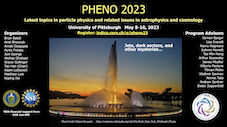Speaker
Description
The hadronization process plays a crucial role in Monte Carlo event generators, where quarks and gluons are combined into observable hadrons. However, while current phenomenological models have been quite successful overall in simulating this process, there remain phenomenological areas where they still lack accuracy in describing the underlying physics. Recent research has taken a new approach by utilizing machine-learning (ML) techniques based on generative models for simulating the hadronization process. However, the recently presented architectures have their own set of limitations.
In this talk, we present an updated version of our MLHad pipeline that overcomes most of the limitations by incorporating normalizing flows (NFs). Our updated approach conditions NFs on different hadron masses and initial configuration energies, which in principle enables the emission of different mesons.
Furthermore, the utilization of NFs grants us access to the kinematical probability distribution of the generated mesons. This allows for the implementation of a reweighting technique, which assigns a weight to each emitted meson, enabling us to estimate the uncertainties associated with the process. We demonstrate the capability of the reweighting technique to evaluate the uncertainty of our model.
